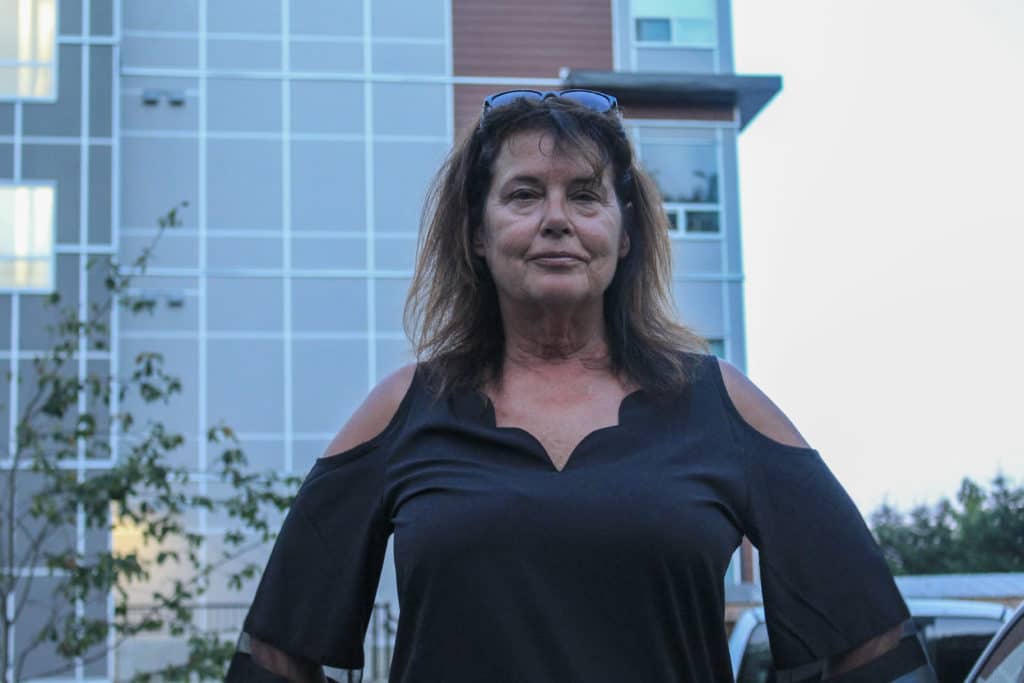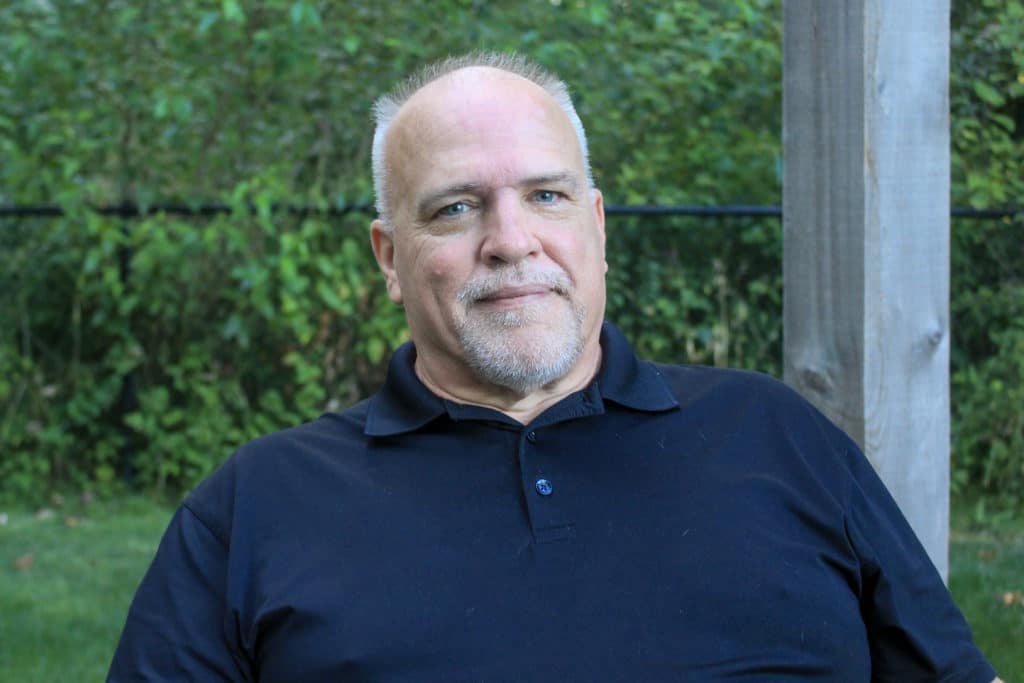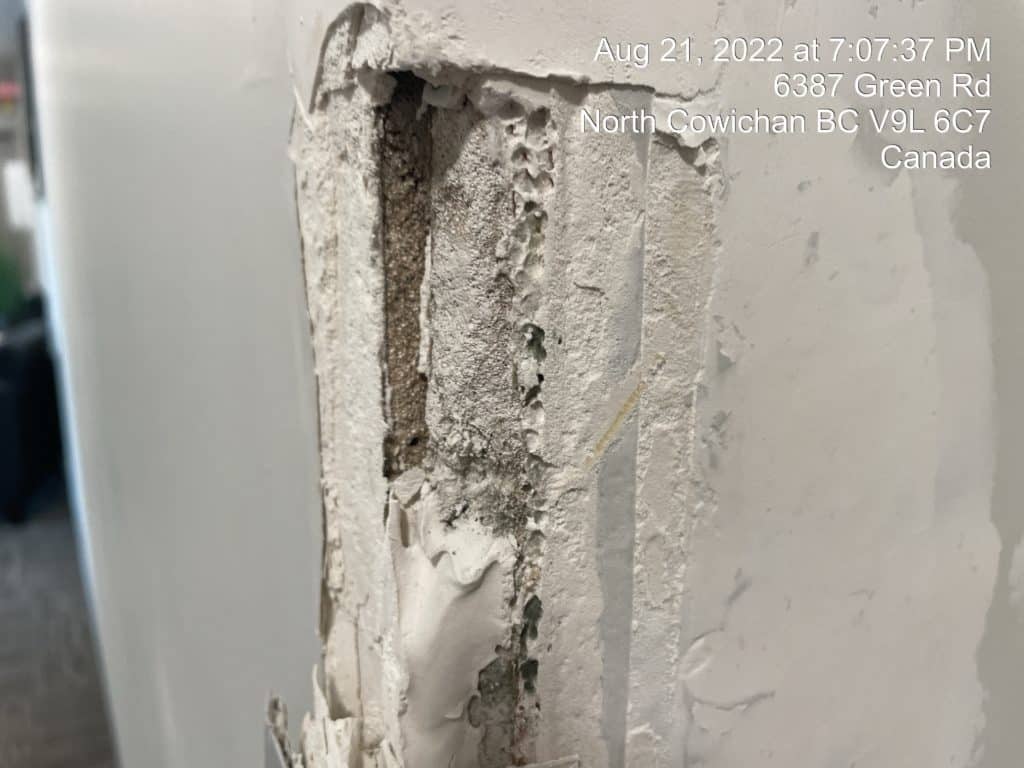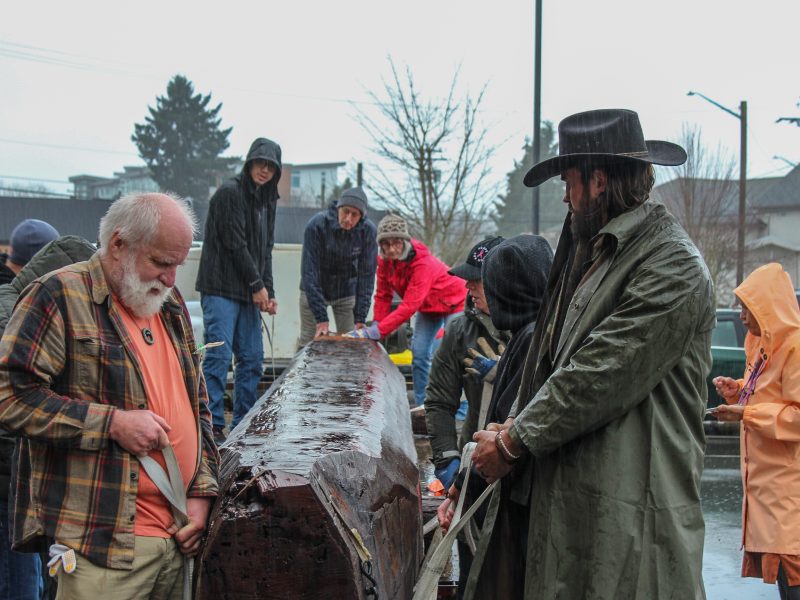
When Anna Stolfi saw the Magdalena apartment complex going up in North Cowichan in 2019, she decided she was going to live there.
Working as a flagger for the hydro team near the construction site, Stolfi witnessed the building come together from the ground up. She frequently told her colleagues that the building would be her new home. When it was finally time for Stolfi to submit an application, her colleagues cheered her on.
“All the foremen were going ‘Yay, Anna!’,” Stolfi says.
But the excitement Stolfi felt to move into the building is long gone and has been replaced with feelings of constant stress and worry.
“They don’t care about us anymore. We’re just a dollar sign. WestUrban has left a pretty sour taste in my mouth,” Stolfi says. The building was developed by WestUrban Development Ltd. and is managed by WestUrban Properties Management. The two companies are related.

Tenants living in the Magdalena building say they have faced maintenance issues since day one of living there. From appliances that don’t work and take months — or years — to replace, to frequent water leaks and shutdowns, residents say they have lost faith in building management.
More recently, tenants learned that the building has major structural deficiencies that need to be addressed. In July, 2022, WestUrban applied to the Residential Tenancy Branch to evict everyone living in the Magdalena for at least six months to carry out necessary remediation work.
Related story: Magdalena apartment complex needs $1.8 million in repairs
The application must go to two hearings — the first of which is in November. After the second hearing, residents will be given four months to find new housing if the application is approved. In June, WestUrban shored up the main slab floor above the building’s parking garage as a temporary measure and says the company has been advised that the building is safe until “more substantial remediation work can be done.”
But tenants say they’re still questioning whether or not it’s safe to remain in the building and have lost trust in WestUrban after years of compounding issues. They’re also organizing to seek compensation and are considering legal action.
“If the building falls down tomorrow, we become a two-day headline and that’s it,” says Magdalena resident Gordon Griffiths. “And then we’re forgotten. Nobody’s going to care.”
Magdalena residents ask for assurances and compensation
Over the past three years, Magdalena residents have created a community in the building. Tenants ranging in age and background come together regularly on a grassy patch beside the building’s parking lot for weekend barbecues. During the week, many are often seen outside having a smoke or taking their pets out while catching up with each other.
On Aug. 13, residents held another barbecue — this time with a distinct purpose. Municipality of North Cowichan councillors Rob Douglas and Tek Manhas attended, as well as Cowichan Housing Association executive director Shelley Cook. Residents wanted to air their grievances about the situation they’re in and about the many issues they’ve put up with at the Magdalena.
Tenants brought lawn chairs outside and sat in a circle, their children and pets joining them. Some tenants took turns describing issues including elevator shut-downs, water leaks, appliance problems, cracks in the walls and more.

As they spoke, councillors Douglas and Manhas listened carefully, while Cook took notes. Residents had a common request. They asked for the Municipality of North Cowichan to arrange a third party to assess the building’s safety to continue to live in. Many tenants are urgently trying to find somewhere else to go, but formal evictions aren’t expected until April at the earliest.
Residents also asked for advocacy to receive more compensation from WestUrban. While WestUrban is offering them one month of rent and their damage deposit back, tenants say it’s not enough to make up for the rising cost of rent, moving expenses and their decline in mental health and wellbeing while living there.
Related story: Developer sues engineers over structural issues at Magdalena apartment complex
“I’m so tired. I haven’t been sleeping properly since all this has happened. I’m lucky if I get four hours of sleep a night,” Stolfi said in an interview during the barbecue. “It’s constantly on my mind. What am I going to do? Where am I going to go? And what about my safety?”
Advocacy for residents
Both Douglas and Manhas told residents they’d bring their concerns forward to council and ask if North Cowichan can arrange a third party review of the building.
In a phone call with The Discourse on Aug. 24, North Cowichan’s director of planning and building Rob Conway said North Cowichan has been working with WestUrban since the end of July and requested that they provide third-party engineering reports to confirm the building’s ongoing safety.
While the reports confirm that shoring was installed and that the building is stabilized, Conway says there was no definitive statement saying the building is safe for occupancy. He says North Cowichan has asked that WestUrban provide another third party review that would include assurance that the Magdalena continues to be safe to live in.
“We believe that the work is underway but we haven’t seen the final report yet,” Conway says.
Cowichan Housing Association executive director Shelley Cook says she attended the barbecue to hear from tenants about their experiences in the building, as well as their concerns and hopes for the future.
“I’m just worrying about physical safety and — if it’s not safe — where people can go, where they can feel safe and have secure housing,” Cook says. “I’m trying to understand what role we can play to generate options knowing there’s no clear answer in this current housing market.”

Cook says she hopes to work with tenants through this entire process by keeping an eye out for rental openings and considering emergency funds and how to support moving costs.
North Cowichan Mayor Al Siebring has requested a meeting with the provincial housing minister to ask for emergency funding, which he says would likely be managed by the Cowichan Housing Association.
Cook says Cowichan Housing Association will work with North Cowichan to ensure there’s follow-up, including the third party building assessment to ensure the building is safe while tenants continue to live there.
Elevator shut-downs leave tenants stranded
While residents wait to hear from decision-makers about a review of the building and support to find housing and funding, they continue to face maintenance issues and disruptions.
Just two days after the barbecue, tenants say the elevator broke down and wasn’t fixed until about twenty four hours later. This, residents say, is a common occurrence.
For residents like Gordon Griffiths, not having a working elevator is detrimental to his wellbeing. Griffiths has a heart condition, among other health issues, and is unable to take the stairs to or from his fifth floor apartment. When the elevator shut down during a long weekend, Griffiths says he had to stay at a campsite because he was unable to get up to his apartment until a technician came to fix the elevator on the next business day. He notes he’s not the only person in the building with mobility issues.
Griffiths says he once called WestUrban to ask if they could send someone to fix the elevator, but was told no one would be available over the weekend or during evenings. He says he then called Richmond Elevator, because the company’s name is on the building elevator. He says he was told a technician could be available if WestUrban agreed to pay an after-hours surcharge. The Richmond Elevator website advertises emergency service availability 24-hours a day.
After phoning WestUrban back to explain that elevator service is available, Griffiths says he was told that it is not a requirement for the elevator to be functional, and that it isn’t in the lease. He alleges that a WestUrban representative also told him that he’s not actually disabled because he isn’t in a wheelchair.
Griffiths relayed some of these details in a phone call with WestUrban chief operating officer Terry Hoff.
“She told us that WestUrban Properties does not care about handicapped people and I couldn’t be that handicapped because I’m not in a wheelchair,” Griffiths said on the call, which he recorded. “Therefore fixing an elevator is not an emergency and they will not call for repairs on evenings and weekends.”
During the call, Hoff said he is noting Griffith’s complaints, with plans to bring them to his team and address them.

“I’ll deal with the elevator issue,” Hoff said. “If an elevator goes down in a building, l ask for a service call to be made immediately. I can’t guarantee when that tech is going to come. I can tell you I don’t ever want to have an elevator down over a weekend at all. I won’t do that. I will make sure those changes are understood through my property management team.”
But according to residents, the elevator has shut down for more than twenty four hours multiple times since then.
North Cowichan’s director of building and planning Rob Conway says he spoke with the municipality’s chief building inspector about requirements for the elevator. He was told that according to the BC Building Code, the Magdalena — a five-storey building — is not tall enough to require an elevator and that the fire safety plan indicates the elevator cannot be used during an emergency. The main floor, however, is designed to be accessible and Conway says tenants with mobility challenges should let the building manager know and request to be moved to the main floor.
But Griffiths says he did let WestUrban know about his mobility challenges when viewing the unit. He says when he first viewed the place the elevator wasn’t running yet. Griffiths let the WestUrban representative at the viewing know about his disability and that he is unable to walk up stairs. For that reason, he viewed a first-floor apartment with a similar layout to the fifth-floor unit he sought to rent. He says he wonders why he wasn’t advised at the time to rent on the ground floor.
“West Urban Properties knew, when I leased this place, that I have disabilities,” Griffiths said to Hoff on the recorded phone call.
In a statement to the Discourse, WestUrban says the company “strives to provide tenants with professional service and respond to maintenance requests in a timely fashion (including over weekends.)” Issues begin to be addressed within 48 hours, WestUrban says, and thrice weekly building inspections take place to “ensure that key elements of the building are in good working order.”
Maintenance issues pile up
During the barbecue, Stolfi walked Shelley Cook through the hallways of the first floor to point out where water damage has occurred. White, square patches cover parts of the ceiling and discoloration of the walls and ceiling is visible.
Earlier, Stolfi explained that her toilet had been leaking for nearly two years before it was fixed. She speaks of cracks in her wall, a bathroom door that wouldn’t fully open and a washing machine that didn’t work the first week she moved in. Now, she says cleanliness in the building isn’t being maintained as it was before.
Stolfi lives on the first floor, and while her unit hasn’t had any flooding, she says she has come home to find water at her doorway from leaks in the hall. Another unit on the first floor flooded twice, she says.

Stolfi has now been to the doctor multiple times after developing a hacking cough and runny nose. She says she is worried about the presence of mould following the leaks. She says fans were brought in to dry the floor and carpet in the hallway, but alleges the carpet wasn’t pulled out and cleaned properly and neither were the walls and ceiling.
In an emailed statement to The Discourse, WestUrban says, “In the event of water leaks or flooding, WestUrban replaces all damaged materials (including piping, drywall and flooring) to ensure that the area is returned to good-as-new condition.”
But Stolfi says she only ever noticed patches of paint and drywall covering small areas where leaks have occurred. WestUrban says it has not received any reports of black mould from tenants, but after years of maintenance requests going unanswered or not being addressed in a timely manner, Stolfi says residents have lost faith in WestUrban’s ability to handle these issues.
“I don’t feel safe at all,” Stolfi says. “I’m paranoid when I hear water dripping.”


WestUrban also says property management, janitorial services and maintenance crews are on site at the same hours they were before with the exception of personal leave absences. But Stolfi, who is home most days due to a back injury, says she only sees them in the building for about one to two hours before they leave.
Griffiths says when he first moved into his unit, his stove would not get hot enough to cook anything and his fridge wouldn’t stay cold enough for his food to stay fresh. It took more than two years of raising the issue to WestUrban before anything was done to replace his appliances, he says. In the meantime, he was using a toaster oven, hot plate and mini fridge.
Griffiths says he went to the Residential Tenancy Branch about these issues, which is when he received the phone call from Hoff.
In the recorded phone call, Griffiths told Hoff that he had to throw out thousands of dollars worth of food because of the defective fridge.
Shortly after the call, Griffiths’s appliances were replaced. But the new fridge, he says, was covered in dents and scratches and only the freezer was working effectively.
Residents at the barbecue voiced several complaints about water leaks, appliance issues, elevator shut-downs, water shut-downs and more — each with their own story to tell. They say they feel the weight of everything piling up on them.
“[WestUrban has] successfully proven what they’re in business to do,” Griffiths said in an interview with The Discourse at the barbecue. “They deserve to make money — why wouldn’t they? — but at what expense?”
Tenants look to legal action
Magdalena tenants are now being forced to look for housing elsewhere, but they have concerns about finding an affordable place to live that meets their needs. With rental rates increasing and low housing availability, the stress of finding a new home, on top of worries about safety in the building, is adding up.
Stolfi organized a residents’ council in the building to figure out what next steps they could take to advocate for themselves. She’s been working to find solutions since hearing the news about WestUrban’s application to evict tenants, on July 26.

Their next goal is to raise money to put towards a retainer for a lawyer and subsequent legal fees. Stolfi says the retainer will cost $2,500, but they’re anticipating needing anywhere between $20,000 and $25,000 to cover legal costs. In a building with many low- to mid-income residents who are already living paycheck to paycheck and now saving for moving costs, that money is hard to come by.
Stolfi says she’s tired, but determined to push ahead to ensure residents are currently safe in the building and receive more compensation.
“It’s a shit show,” Stolfi said at the barbecue. “They figure we’re all just going to roll away and we’re not going to do anything. But for all the stress they’ve caused … we need some help.”
Editor’s note, Sept. 1, 2022: This article has been edited to avoid potentially confusing language about the timing of evictions and the Residential Tenancy Branch process.



